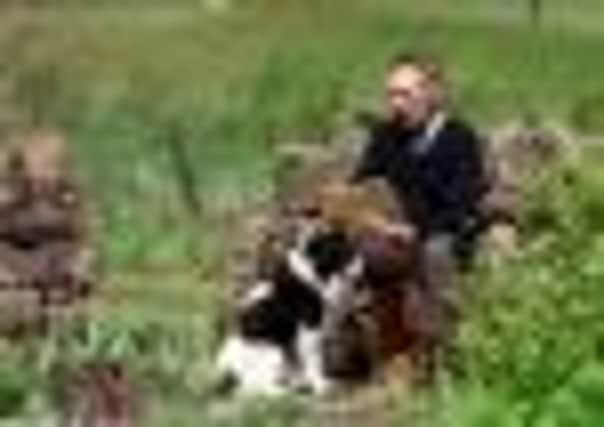Obituary: Davie Kerr, West Lothian patriot was staunch SNP supporter and one of the party’s first councillors


For a patriotic Scot who spent most of his life in Armadale, it should have come as something of a surprise to discover, in his 90s, that he had Anatolian blood running through his veins.
But the revelation failed to flummox staunch SNP supporter Davie Kerr, who maintained he’d always known it.
Advertisement
Hide AdAdvertisement
Hide Ad“I always had an affinity with Turkish people,” he said, in response to the results of a DNA test.
And while it tickled him, it certainly didn’t make him any less Scottish – as if such an eventuality could have been possible.
Born and brought up in the West Lothian town, he wed there, worked there and supported the Nationalist cause from there as one of the first SNP councillors – the only one on Armadale Town Council in the 1970s – and latterly was a strong advocate of Scottish independence. He was still debating the merits of a Yes vote on the day he died.
The son of Armadale master builder James Kerr and his Banffshire wife Mary, he was one of a family of five; three boys and two girls. Educated at Armadale Primary School and Lindsay High School, Bathgate, at 14 he began an apprenticeship as a bricklayer with his father’s business. He also went on to attend college in the evenings, but that aspect of his education came to a halt with the Second World War.
He joined the Reconnaissance Corps for officer training and was later commissioned into the Gordon Highlanders. On D-Day Plus 12, in mid-June 1944, he was deployed to help liberate the town of Best, in the Netherlands, which he recently visited with his grandson. When the authorities realised he was a returning Scottish soldier, he was personally thanked by the town’s mayor and introduced to some of the elderly residents who had been liberated by the Allies. Following his wartime service there, he moved on to Belgium, but was shot in the knee and returned home to recuperate in Ayrshire. By VE day he was acting captain of a holding platoon in Ayr and was headed to the Far East when Victory in Japan was declared. He ended his war while serving in Egypt.
Back in Scotland he was reunited with his wife Annie, a local nurse, whom he had met at a dance and married at Armadale Church following a whirlwind wartime romance. He returned to work with his father but when his dad retired he set up his own firm, D Kerr Building Contractors, which remains a thriving business today.
He joined the SNP in 1948 and later worked for and promoted Billy Wolfe, who led the party to its greatest Westminster electoral success in 1974.
By this time Kerr was already a councillor, serving from 1970 to 1975. A quiet, thoughtful and well-read man, he maintained he was not a natural politician, and it was an uphill struggle being the sole SNP member on a Labour-dominated council but he pushed on, fighting for a number of local issues.
Advertisement
Hide AdAdvertisement
Hide AdThough he was a persuasive debater, and the part-time, evening meetings suited his work commitments, he did not stand for the new authority following local government re-organisation in 1975.
He did, however, become a member of the local community council and remained a central figure in the local SNP, knowing many of the current MSPs as young politicians rising through the ranks.
He was delighted to witness the creation of the Scottish Parliament and worked away in the background supporting the SNP where he could. Among those who attended his funeral was Fiona Hyslop, Linlithgow MSP and cabinet secretary for cultural and external affairs.
Local culture, language and history were subjects dear to him. He was involved in the History of Armadale Association and, along with his late brother Robert, had written three books on the local history of Armadale, Torpichen and Blackridge.
His brother died before he could finish another book, Armadale By Minutes, featuring the community’s history through its council minutes, which Davie Kerr later completed.
His own writing focused on poetry in the Scots tongue. Two volumes of his poems have already been published – A Puckle Poems and A Puckle Mair – with a third in the pipeline. Excerpts from A Puckle Poems were used in The Dictionary of the Scots Language.
He helped to set up West Lothian Broadly Scots Society, creating several editions of a local dictionary and taking the Scots language into local schools in a drive to keep the dialect of his youth alive.
Other interests included his chickens, collies and a former steeplechaser he brought home and nursed back to health, teaching himself to ride in the process. He was still on horseback at the age of 92.
Advertisement
Hide AdAdvertisement
Hide AdHe was also widely travelled, often taking off on his own. After retiring, in his mid-60s, he backpacked round India for two months. In his late-80s, he walked the Great Wall of China and went dog sledding in northern Canada.
He had also been off the beaten track in New York, Italy and Turkey – though he only discovered his Anatolian ancestry after his family gifted him a DNA test for Christmas – and had threatened to go up the Amazon in a canoe.
For all his adventures, his life was deeply rooted in West Lothian, where he worked for the good of his family and his community, respecting and taking all as he found them.
Predeceased by his wife Annie and son David, he is survived by his children Mary, Gordon and Douglas; grandchildren Lesley, Lorna, Elizabethann and David; four great-grandchildren; brother Jimmy; and sisters Jessie and Agnes.
ALISON SHAW